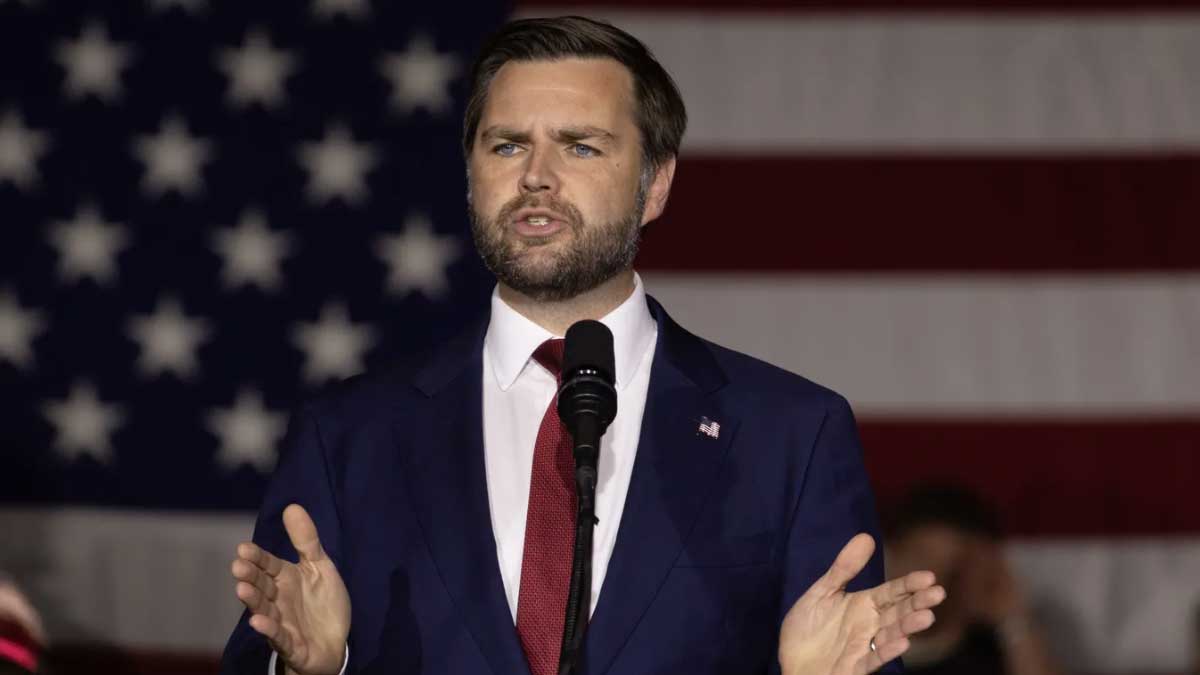- Home
- Billionaires
- Investing Newsletters
- 193CC 1000
- Article Layout 2
- Article Layout 3
- Article Layout 4
- Article Layout 5
- Article Layout 6
- Article Layout 7
- Article Layout 8
- Article Layout 9
- Article Layout 10
- Article Layout 11
- Article Layout 12
- Article Layout 13
- Article Layout 14
- Article Sidebar
- Post Format
- pages
- Archive Layouts
- Post Gallery
- Post Video Background
- Post Review
- Sponsored Post
- Leadership
- Business
- Money
- Small Business
- Innovation
- Shop
Recent Posts
Vance Defends Puerto Rico Joke, Urges Americans to Lighten Up

Senator JD Vance of Ohio, running mate to former President Donald Trump, responded on Monday to a controversial joke about Puerto Rico made by comedian Tony Hinchcliffe. The joke, widely criticized as offensive and racist, referred to Puerto Rico as “a floating island of garbage.” Vance dismissed the backlash, stating that Americans need to stop getting offended by every remark. “I’m so over it,” Vance remarked during a rally in Wausau, Wisconsin, adding, “We have to stop getting so offended at every little thing in the United States of America.”
Speaking to rally attendees, Vance admitted that he had not personally heard the joke and refrained from commenting on its specifics. “Maybe it’s a stupid racist joke,” he said, “or maybe it’s not.” The senator’s remarks drew attention not only for their dismissive tone but also for contrasting with efforts from the Trump campaign to distance itself from the controversial comedian. The joke that sparked the controversy was made by Hinchcliffe during Trump’s rally at Madison Square Garden on Sunday. As part of his comedic set, the roast comic quipped, “There’s literally a floating island of garbage in the middle of the ocean right now. I think it’s called Puerto Rico.” The comment immediately drew criticism from across the political spectrum, with backlash coming from Democrats, Republicans, and public figures alike. While Vance argued that the country needs a greater sense of humor, others were quick to condemn the joke as inappropriate and offensive.
Despite Vance’s remarks suggesting the joke was harmless, the Trump campaign took a different stance. Danielle Alvarez, a senior adviser to the Trump campaign, issued a statement distancing Trump and his team from Hinchcliffe’s remarks. “This joke does not reflect the views of President Trump or the campaign,” Alvarez emphasized. The campaign’s quick response highlights the tightrope it continues to walk between engaging in provocative rhetoric and avoiding backlash that could alienate voters. Vance, however, used the incident to deliver a broader message about political correctness, lamenting the lack of tolerance for humor. “We are not going to restore the greatness of American civilization if we get offended at every little thing,” he said during the rally. “Let’s have a sense of humor.” Before concluding his speech, he added, “Can we all just take a chill pill and take a joke from time to time? This is ridiculous.”
The backlash to Hinchcliffe’s comments was swift and widespread, especially from lawmakers of Puerto Rican descent. Representative Ritchie Torres, a Democrat from New York, blasted the comedian on social media. “I am tempted to call Hinchcliffe racist garbage, but doing so would be an insult to garbage,” Torres wrote on X, formerly known as Twitter. Representative Alexandria Ocasio-Cortez, also from New York, criticized the comedian’s remarks, suggesting they crossed a dangerous line. “This isn’t the comedy store,” Ocasio-Cortez tweeted. “You’re using your set to boost neo-Nazis… your ‘sense of humor’ doesn’t change that.” Several Republican lawmakers also spoke out against the joke, indicating that the controversy extended beyond party lines. Florida representatives Maria Elvira Salazar and Carlos Gimenez, along with Senator Rick Scott, publicly denounced Hinchcliffe’s remarks. Their responses underscore the growing pressure within the Republican Party to distance itself from inflammatory rhetoric that risks alienating key voter blocs, such as the Latino community.
In the aftermath of the incident, Vice President Kamala Harris unexpectedly received support from prominent Puerto Rican celebrities. The backlash against the joke motivated figures like Jennifer Lopez, Bad Bunny, and Ricky Martin to express solidarity with Harris on social media. With millions of followers on Instagram—250 million for Lopez, 45.6 million for Bad Bunny, and 18.6 million for Martin—their posts amplified criticism of the Trump campaign and its association with the incident. Singer-songwriter Marc Anthony also weighed in, using the moment to remind followers of Trump’s controversial handling of Hurricane Maria relief efforts. “I remember what it was like when Trump was president,” Anthony wrote on X. “I remember after Hurricane Maria devastated our island… Trump blocked billions in relief… while thousands died.” The comments from celebrities not only condemned Hinchcliffe’s remarks but also reignited criticism of Trump’s past actions toward Puerto Rico, potentially influencing voter sentiment ahead of the election.
Trump’s rally at Madison Square Garden was notable not only for Hinchcliffe’s controversial joke but also for the tone set by other speakers. Nearly 30 individuals took the stage before Trump, many delivering raunchy jokes and extreme comments that drew attention. However, it was Hinchcliffe’s reference to Puerto Rico—and a separate comment about Latinos—that triggered the most significant backlash. The incident highlights ongoing tensions within Trump’s political orbit. While the former president and his allies often embrace provocative rhetoric to energize their base, such remarks can quickly backfire, leading to damage control efforts by the campaign. The episode also underscores the difficulty in balancing humor with political discourse in a highly polarized environment.
The controversy over Tony Hinchcliffe’s joke about Puerto Rico has placed JD Vance, the Trump campaign, and their messaging strategy under scrutiny. Vance’s dismissal of the backlash as overblown and his call for Americans to “take a chill pill” reflect a desire to push back against political correctness. However, the Trump campaign’s attempt to distance itself from the joke indicates an awareness of the potential fallout from such remarks. As the 2024 election campaign progresses, incidents like these will likely continue to test the boundaries of rhetoric, humor, and accountability. With influential figures from both political parties and the entertainment industry weighing in, the fallout from Hinchcliffe’s joke may resonate beyond the immediate controversy, shaping narratives about Trump’s campaign and its relationship with diverse communities.
Recent Posts
Categories
- 193cc Digital Assets2
- 5G1
- Aerospace & Defense46
- AI37
- Arts3
- Banking & Insurance11
- Big Data3
- Billionaires449
- Boats & Planes1
- Business328
- Careers13
- Cars & Bikes76
- CEO Network1
- CFO Network17
- CHRO Network1
- CIO Network1
- Cloud10
- CMO Network18
- Commercial Real Estate7
- Consultant1
- Consumer Tech180
- CxO1
- Cybersecurity68
- Dining1
- Diversity, Equity & Inclusion4
- Education7
- Energy8
- Enterprise Tech29
- Events11
- Fintech1
- Food & Drink2
- Franchises1
- Freelance1
- Future Of Work2
- Games141
- GIG1
- Healthcare78
- Hollywood & Entertainment186
- Houses1
- Innovation42
- Investing2
- Investing Newsletters4
- Leadership65
- Lifestyle11
- Manufacturing1
- Markets20
- Media193
- Mobile phone1
- Money13
- Personal Finance2
- Policy567
- Real Estate1
- Research6
- Retail1
- Retirement1
- Small Business1
- SportsMoney33
- Style & Beauty1
- Success Income1
- Taxes2
- Travel10
- Uncategorized8
- Vices1
- Watches & Jewelry2
- world's billionaires418
Related Articles
Trump Moves $4B Stake in Truth Social Parent, Stock Drops 6%
Donald Trump recently transferred his 57% stake in Trump Media & Technology...
By 193cc Agency CouncilDecember 20, 2024House Rejects Trump-Backed Funding Bill, Shutdown Looms
The U.S. House of Representatives rejected a new government funding bill on...
By 193cc Agency CouncilDecember 20, 2024Trump Named Time’s Person of the Year for Second Time
On Thursday, Time magazine honored Donald Trump as its “Person of the...
By 193cc Agency CouncilDecember 12, 2024Meta Donates $1 Million to Trump’s Inaugural Fund
Meta, the parent company of Facebook and Instagram, has confirmed a $1...
By 193cc Agency CouncilDecember 12, 2024















Leave a comment